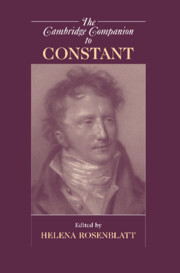Book contents
- Frontmatter
- Introduction
- 1 Benjamin Constant: Life and Work
- Part I The Political Thinker and Actor
- 2 Liberalism’s Lucid Illusion
- 3 The Liberty to Denounce: Ancient and Modern
- 4 Constant’s Idea of Modern Liberty
- 5 Benjamin Constant and the Terror
- 6 Constant’s Thought on Slavery and Empire
- 7 Benjamin Constant as a Second Restoration Politician
- Part II The Psychologist and Critic
- Part III The Analyst and Historian of Religion
- Conclusion
- 15 Eclipses and Revivals Constant’s: Reception in France and America 1830-2007
- Bibliography
- Index
- Series List
7 - Benjamin Constant as a Second Restoration Politician
from Part I - The Political Thinker and Actor
Published online by Cambridge University Press: 28 July 2009
- Frontmatter
- Introduction
- 1 Benjamin Constant: Life and Work
- Part I The Political Thinker and Actor
- 2 Liberalism’s Lucid Illusion
- 3 The Liberty to Denounce: Ancient and Modern
- 4 Constant’s Idea of Modern Liberty
- 5 Benjamin Constant and the Terror
- 6 Constant’s Thought on Slavery and Empire
- 7 Benjamin Constant as a Second Restoration Politician
- Part II The Psychologist and Critic
- Part III The Analyst and Historian of Religion
- Conclusion
- 15 Eclipses and Revivals Constant’s: Reception in France and America 1830-2007
- Bibliography
- Index
- Series List
Summary
Much as he would have wanted, Benjamin Constant has attracted more attention as a writer and thinker than as a practicing politician, although the importance of his political career has long been recognized and biographies do provide extensive information concerning his contributions as journalist, pamphleteer, and parliamentarian. The latter works, however, view Constant from the perspective of the individual, rather than as part of a group. Thus, in order to view him in a new light, this essay will place Constant within the context of the Second Restoration Liberal Opposition as a means to discuss his role as a practicing politician.
Although frequently referred to as the parti libéral by contemporaries, the Opposition was not a political party in the modern sense. The Opposition had no party platform, deputies voted according to their individual inclinations, and there was no card-carrying membership among supporters. Nor were all Liberals necessarily liberal in political or economic philosophy; among the Opposition there were many former Bonapartists or Jacobins whose liberalism was more a product of circumstance than doctrinal conviction.
- Type
- Chapter
- Information
- The Cambridge Companion to Constant , pp. 146 - 170Publisher: Cambridge University PressPrint publication year: 2009
- 3
- Cited by

